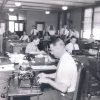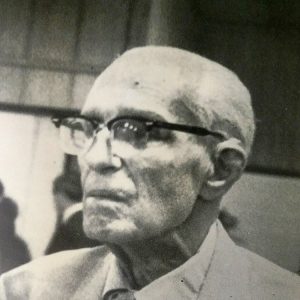calsfoundation@cals.org
Alexander Henry Washburn (1899–1983)
Alexander Henry (Alex) Washburn was a prominent conservative newspaperman in southern Arkansas who served as the editor and publisher of the Hope Star for fifty-four years. Washburn sought to stay ahead of the technology curve, and in 1942, the Star began one of the world’s first transmissions by wire of newspaper content from other papers. The Star was also an early user of offset printing, 35 mm photography, and the four-color process.
Alex Washburn was born on August 12, 1899, in Toronto, Canada, to American parents from Pennsylvania and Illinois. His father, William Henry Washburn, was an official with Metropolitan Life Insurance Company, and his mother, Annie Henry Washburn, was a homemaker. Washburn was the oldest of three sons and two daughters.
The family relocated to Wilkes-Barre, Pennsylvania, and Washburn graduated from Wyoming Seminary, a Methodist preparatory school in Kingston, Pennsylvania, in 1917. After attending Oberlin College in Ohio, he attended Columbia University’s journalism school his junior year before graduating from the journalism school at the University of Missouri in 1923.
The day after graduation, he began his career in a university-arranged job at the El Dorado Daily News and, three years later, was promoted to editor, the youngest in Arkansas at that time. A year after Washburn’s promotion, Clyde Palmer of Texarkana (Miller County) purchased the Daily News, and Washburn began seeking an opportunity to strike out on his own. In 1929, after obtaining a loan from his father, Washburn purchased the evening Star of Hope and the morning Hope Daily Press and consolidated them into the Hope Star. At the last moment, Palmer and Washburn entered into a half-interest in the paper, which lasted until Palmer’s death in 1958. (Palmer’s capital was reportedly critical to updating the newspaper’s technology, but Washburn long remained displeased at the necessity of the partnership.) Bettie Palmer, Clyde Palmer’s widow, succeeded to her husband’s half-share before selling it to Washburn in 1967. Clyde Palmer’s remaining share became part of Texarkana Newspapers, Inc., headed by Walter Hussman Sr., Clyde Palmer’s son-in-law. (This was the forerunner of WEHCO Media, Inc.)
Washburn dominated the local media scene for five decades, with the exception of brief competition from the morning Hope Journal, owned by future Arkansas secretary of state Kelly Bryant. In 1948, Washburn established Hope Broadcasting Company and put radio station KXAR-AM on the air. Federal regulators compelled the sale of the station in 1976 to a group of investors known as Sandia ’76, led by businessman George Frazier, who Washburn originally hired as KXAR’s general manager. One of the on-air talents developed by the station under his ownership was a young Mike Huckabee, future governor of Arkansas.
The Star under Washburn was noted for its crusading conservative editorial stance in both local and state affairs, and a limited-government philosophy at the national level, all consistent with Washburn’s well-known frugality and insistence on efficiency. His one-man editorial page, “Our Daily Bread: Sliced Thin by the Editor: Alex H. Washburn,” was a smorgasbord of opinions on topics such as government waste, reform, liquor prohibition, and the misdeeds of local politicos. In the Saturday edition, editorial contributions from other papers were shared in an edition titled, “With Other Editors.” He was vehemently opposed to both urban renewal and revenue sharing, and he continually blasted federal planning. However, he considered one of his chief victories to be the extension of a municipal water supply from Millwood Lake to Hope (Hempstead County), an action for which he had lobbied in the lake’s initial planning process in the 1950s. The Hope Water System facility was dedicated two weeks before his death.
Washburn’s first encounter with a young Bill Clinton was outside the Arlington Hotel in Hot Springs (Garland County) in 1968, when Clinton was working for Senator J. William Fulbright’s reelection campaign. Clinton engaged in a loud, heated argument about the Vietnam War with his hometown newspaper publisher. As the years progressed, the two men developed a mutual respect despite philosophical disagreements.
Washburn died on May 16, 1983, and is buried with family members in West Dallas, Pennsylvania; he had never married. In Washburn’s memory, the May 16 evening edition contained on the left side of the front page, “Our Daily Bread: Sliced Thin by the Editor: Alex H. Washburn,” heading a blank column.
His seventy-six-percent share of the paper was willed to a family trust, with management duties passing to his two most trusted employees: Circulation Manager C. M. “Pod” Rogers and Mechanical Superintendent D. E. “Gene” Allen. The remaining twenty-four percent remained under the ownership of WEHCO Media, with the stipulation in Washburn’s will that WEHCO would never gain more of the Star than it already owned. The paper was sold a year after Washburn’s death.
An editorial from Star managing editor Billy Burton two days after Washburn’s death quoted Washburn’s editorial philosophy: “What good is an editorial if it is not controversial? My philosophy is that a bad editorial is better than no editorial at all.”
For additional information:
“Death Claims Star Publisher Washburn.” Hope Star, May 16, 1983, pp. 1, 12.
Burton, Billy. “‘Opinion’ Debuts: New Star Feature.” Hope Star, May 18, 1983, p. 2.
———. “Star Trust Established; Paper to Be Run by Two Employees.” Hope Star, June 6, 1983, p. 1.
McDougal, Jim. Arkansas Mischief: The Birth of a National Scandal. New York: Henry Holt and Company, 1998.
“Star Management to Continue with Late Publisher’s Own Philosophy.” Hope Star, June 7, 1983, p. 1.
Revis Edmonds
Arkansas State University
 Mass Media
Mass Media World War II through the Faubus Era, 1941 through 1967
World War II through the Faubus Era, 1941 through 1967 Alexander Washburn
Alexander Washburn 




Comments
No comments on this entry yet.